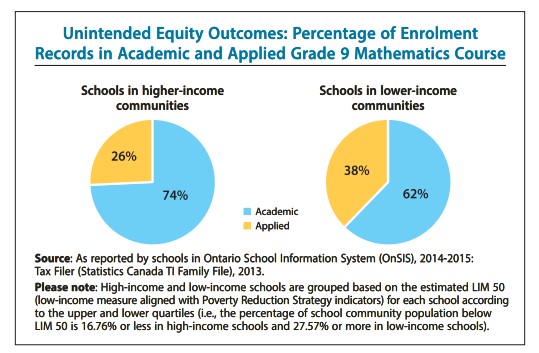Streaming, identity-based data, and hiring in Ontario schools
Changes to Ontario’s education system will give more students a chance for success.
The province has committed to review streaming in grade 9 and 10, and look at other parts of the system that are creating inequity for students. Ontario’s new Equity in Education Action Plan includes plans for:
- Revising curriculum, teaching, and assessment to ensure they are inclusive and culturally relevant
- Reviewing Applied and Academic courses in grade 9
- Addressing suspension and expulsion rates
- Collecting identity-based student data, starting in grade 4, including:
- race, ethnicity, religion, disability, sexual orientation, gender identity, indicators of parental socio-economic status
- Enhancing diversity in hiring and promotion of teachers, school board and Ministry of Education staff
Background: Streaming in grades 9 and 10
In grades 9 and 10, students can choose either Applied (more practical) or Academic (more theoretical) courses in core subjects. When these courses were first developed, the idea was that students could “mix and match” them. Both types of courses were intended to be pathways to success.
The reality has turned out differently. 
Reports, data and research from York University, the Toronto District School Board, the EQAO, and the provincial government show that students who take Applied math in grade 9 are less likely to be successful on EQAO tests, less likely to graduate, and less likely to go on to any form of post-secondary education (even though Applied courses are intended to be a pathway to college). Just as worryingly, the studies also show a relationship between the percentage of students in Applied courses and neighbourhood income; and that, in the TDSB, black students were twice as likely as white students to be in Applied courses. 
The evidence is unequivocal that education outcomes have a long-term impact on everything from employability and income to health. Shifts in streaming in grades 9 and 10 may ensure that more students – particularly students facing disadvantage – are more successful in school.
People for Education has recommended that the province let students put of decisions involving academic and applied courses until later in secondary school. We have also recommended a new strategy for the learning opportunities grant to fund programs and resources targeted at students whose socio-economic status, ethnicity, or race may put them at greater risk of struggling in school.
